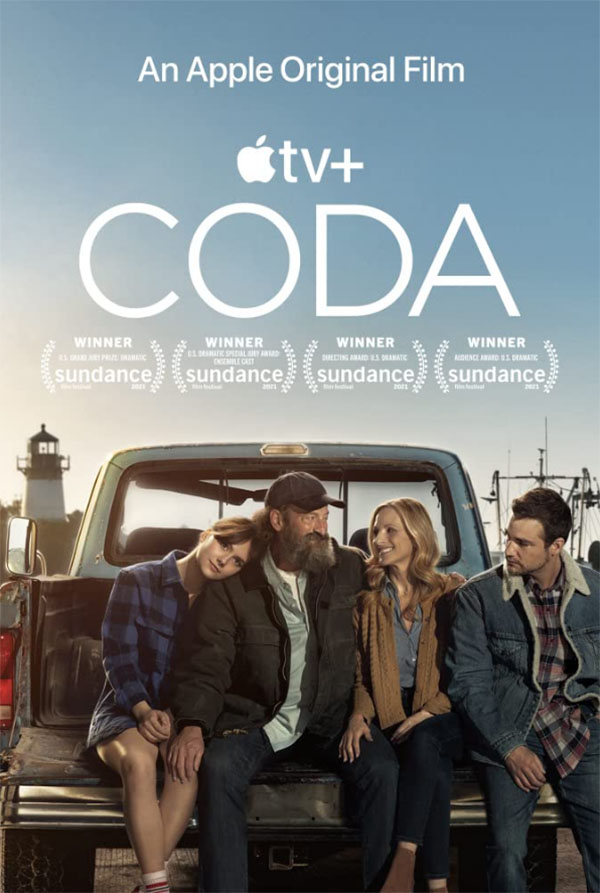The acronym CODA – child of deaf adults – is, perhaps, an unusual name for the new Apple TV+ family drama. Yes, in name, Sian Heder’s “CODA” is nominally the story of Ruby Rossi. Ruby is the only hearing family member in the Rossi family; her mother, father and brother are all Deaf. This makes Ruby particularly essential for the family’s fishing business, as the link between the culturally Deaf family and the hearing world. Ruby discovers a passion for singing in her senior-year in high-school and as a well-intentioned teacher begins to tutor her she finds her personal desires clashing with her familial responsibilities.
The film’s central crisis is dovetailed into a kind of coming-of-age story. Ruby will come of age, learn to negotiate her role as an individual alongside her role within her family and the story will end as she completes high-school. But, thinking of “CODA” through the prism of a coming-of-age story may be a reading that overshadows the foundations of its charm. And “CODA” works best when it observes the dynamics of a family that are familiar even in their difference.
In an early scene, Ruby accompanies her father (an excellent Troy Kotsur as Frank Rossi) to the doctor, serving as translator. As Frank, through Ruby, explains his condition, the doctor diagnoses him with jock itch. He’s prescribed treatment, which includes a recommended bout of abstinence. Frank is indignant. Ruby is horrified. And the doctor, illiterate in sign language, is left askance. It’s a moment, like many in “CODA,” that works as much from a set-up that is familiar in how it prepares the audience for an expected punchline but deepens itself for the way it perceives the specific way familiar issues affect the Deaf community. And it’s that perception that is one of the central dynamics of “CODA”.
Newcomer Emilia Jones, as Ruby, is carrying a lot of weight in the main role and “CODA” earns particular distinction for casting three Deaf actors in the family roles. Kotsur as her father, Daniel Durant as her brother, Leo, and Oscar winner Marlee Matlin as her mother, Jackie. Even as Ruby’s high-school identity crisis forms a pleasant base for the film, Heder (working as director and screenwriter) explores nuance in the family dynamics. While Ruby and Frank enjoy a chaotically hilarious father-daughter bond, “CODA” finds emotional dynamics in the other relationships. In one of the film’s best scenes, Matlin as Jackie delivers a searing explanation of how she wishes that Ruby were born deaf like her brother. It’s a moment of surprising emotional heft, particularly in a film that – up to that point – had felt lighter and more upbeat. It’s that kind of relationship with tension—finding emotional touchstones in familiar areas—that makes “CODA” work.
There’s a particular scene which emphasises this. Late in the film, Ruby’s family sits in support of her in a public function in a crowded auditorium. The camera circles the audience, and meets the family with a focus on Matlin’s face watching on in adoration. In a moment that jolts, our perspective shifts from hearing what’s being said to piercing the perspective of Jackie as we are thrust into the soundscape of her experience. It’s more impactful as an experience, than it is as something explained. And it speaks to the fragility of the film, but also of family dynamics that feel paradoxically both tender and fortified.
That “CODA” wraps this perceptive experience of Deaf culture through the coming-of-age of its one hearing family member that feels reminiscent of many high-school stories isn’t a demerit. In fact, in the expected moment where Ruby must sing her heart out at the film’s end – the song choice, for all its obviousness, feels thoughtful because that familiarity cannot negate the film’s earnestness. Its sweetness is not saccharine, and its earnestness is not forced.
For all its heart-warming overtures, and for all the ways that “CODA” is bound to be hailed as ‘the film we need right now’ amidst a message of hope, it exists beyond those pleasantries. What really works about this film are the rougher edges, the moments of ambivalence on the margins (and even at the centre) and its firm awareness of uncertainty. A confrontation between Deaf brother and hearing sister pierces because of the way it refuses to offer a solution to its crisis. A final moment between parent and child feels hopeful but also unresolved. Yes, this is a very familiar riff on a familiar genre. The struggle between familiarity and the unknown is central to the crisis of “CODA” and as Ruby wrestles between her concerns about being abnormal and the normalcy that marks her own family any family is bound to find moments it can recognise. “CODA”, when it is at its best, mines the tension in that uncertainty and so even its warmest moments are not about unblinkered joy, but about the real and recurring tension of navigating a world that requires consistent compromises. It’s a hopeful, but messy, ode to the dynamics of family.
CODA began streaming on AppleTV+ on August 13.




